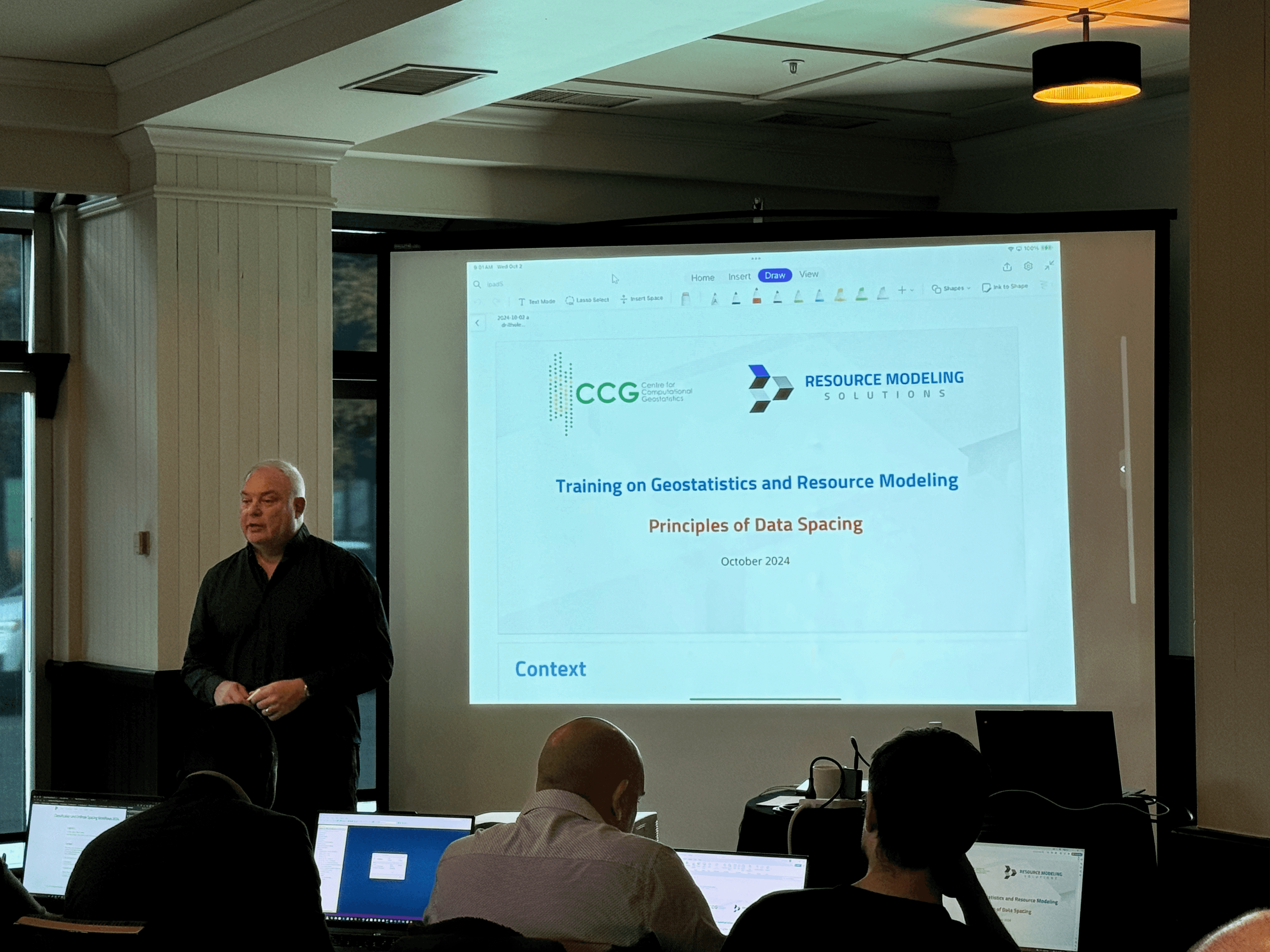
Tr
Training
Click on the type of training you are interested in below
to learn more about it and to view the schedule.

Choose from a wide selection of geostatistical modeling classes hosted online and in person. Courses range from conventional estimation to advanced simulation, Python programming fundamentals, data spacing studies and more. Courses include pre- and post-course material, as well as data and complete solutions for each module completed in RMSP, for reference and experimentation. In-person courses are being held in multiple locations listed below. Registration is now open for 2026 courses.

Geostatistics Short Courses Schedule
Online Modules on Fundamentals of Geostatistics
Introduction to Modern Geostatistics
Theory
May 15
Provides a high level overview of modern geostatistics including workflows for long range resources, drill hole spacing and classification, grade control and geometallurgical modeling. This is suitable for a wide audience including managers, staff from other disciplines who want to know about geostatistics and those that want a refresher.
Provides a high level overview of modern geostatistics including workflows for long range resources, drill hole spacing and classification, grade control and geometallurgical modeling. This is suitable for a wide audience including managers, staff from other disciplines who want to know about geostatistics and those that want a refresher.
Practice
May 22
Introduce RMSP and utilize it for loading and processing drill data, performing wireframe flagging, defining a block model, and visualization. These results will be input to subsequent session exercises, as each practical session will incrementally build an estimation workflow (data management here, EDA and capping in the next session, etc.).
Introduce RMSP and utilize it for loading and processing drill data, performing wireframe flagging, defining a block model, and visualization. These results will be input to subsequent session exercises, as each practical session will incrementally build an estimation workflow (data management here, EDA and capping in the next session, etc.).
Exploratory Data Analysis and Outlier Management
Theory
May 29
Covers exploratory data analysis including multivariate and outlier management. Statistical displays and summary statistics for univariate and multivariate continuous and categorical variables. Outlier management by visual, statistical and geostatistical simulation- based methods are presented with examples.
Covers exploratory data analysis including multivariate and outlier management. Statistical displays and summary statistics for univariate and multivariate continuous and categorical variables. Outlier management by visual, statistical and geostatistical simulation- based methods are presented with examples.
Practice
June 5
Covers loading processed data, wireframes, etc. from the prior session and perform exploratory analysis including duplicate removal, bias analysis, domaining analysis, outlier analysis/ capping, and contact analysis / boundary definition.
Covers loading processed data, wireframes, etc. from the prior session and perform exploratory analysis including duplicate removal, bias analysis, domaining analysis, outlier analysis/ capping, and contact analysis / boundary definition.
Variograms
Theory
June 12
Focused on the calculation, interpretation, and modeling for continuous and categorical variables. The practical steps to obtain a geologically realistic and suitable variogram for all required variables are covered. Combining general geological knowledge with sparse drill data for the best possible variogram is reviewed. Change of support will be summarized.
Focused on the calculation, interpretation, and modeling for continuous and categorical variables. The practical steps to obtain a geologically realistic and suitable variogram for all required variables are covered. Combining general geological knowledge with sparse drill data for the best possible variogram is reviewed. Change of support will be summarized.
Practice
June 19
Covers loading the capped data from the prior session and perform basic variography, including analysis of the nugget effect, directional experimental variograms, and variogram model fitting. Details on directional analysis, including variogram spheres, neutral models, and variogram volumes/ maps are then reviewed.
Covers loading the capped data from the prior session and perform basic variography, including analysis of the nugget effect, directional experimental variograms, and variogram model fitting. Details on directional analysis, including variogram spheres, neutral models, and variogram volumes/ maps are then reviewed.
Estimation and Kriging
Theory
July 10
Fundamental aspects of estimation including validation and setup for different model applications (implicit modeling/visualization, final estimates, interim estimates and probabilistic prediction). The theory will be developed. Attention will be given to practical application, parameter selection and validation of the results. Measures of performance are reviewed.
Fundamental aspects of estimation including validation and setup for different model applications (implicit modeling/visualization, final estimates, interim estimates and probabilistic prediction). The theory will be developed. Attention will be given to practical application, parameter selection and validation of the results. Measures of performance are reviewed.
Practice
July 17
Covers loading the capped data, block model, and variogram models from prior sessions, before performing ordinary kriging of the block model, and in cross- validation mode. Construct nearest neighbor and inverse distance models and perform basic checking. More details on kriging calibration, multi - pass, and high - yield practices are then reviewed.
Covers loading the capped data, block model, and variogram models from prior sessions, before performing ordinary kriging of the block model, and in cross- validation mode. Construct nearest neighbor and inverse distance models and perform basic checking. More details on kriging calibration, multi - pass, and high - yield practices are then reviewed.
Local Uncertainty
Theory
Aug. 14
The theory and practical application of the multivariate Gaussian (multiGaussian) model in geostatistics is reviewed, bridging between estimation and simulation concepts in adjacent sessions. The prerequisite normal score transform is introduced. MultiGaussian kriging is performed in normal scores, generating local conditional distributions of uncertainty. This may be extended to Bayesian updating, which is used for effective integration of multiple data sets.
The theory and practical application of the multivariate Gaussian (multiGaussian) model in geostatistics is reviewed, bridging between estimation and simulation concepts in adjacent sessions. The prerequisite normal score transform is introduced. MultiGaussian kriging is performed in normal scores, generating local conditional distributions of uncertainty. This may be extended to Bayesian updating, which is used for effective integration of multiple data sets.
Practice
Aug. 21
Data, parameters, and estimates (for declustering) will be loaded from prior sessions. A normal score transform is then performed, before performing multiGaussian kriging. Local conditional distributions are back-transformed before being summarized with an estimate and other uncertainty metrics. The example is extended to include secondary variables, which are incorporated into the local distributions of uncertainty using Bayesian updating..
Data, parameters, and estimates (for declustering) will be loaded from prior sessions. A normal score transform is then performed, before performing multiGaussian kriging. Local conditional distributions are back-transformed before being summarized with an estimate and other uncertainty metrics. The example is extended to include secondary variables, which are incorporated into the local distributions of uncertainty using Bayesian updating..
Simulation Fundamentals
Theory
Aug. 28
The fundamental principles of simulation and, in particular, Gaussian simulation are covered. Unconditional simulation and conditioning by kriging are presented. Simulation with a trend (via detrending) is also outlined, along with essential checks. Alternative implementations such as turning bands, sequential, and spectral will be reviewed.
The fundamental principles of simulation and, in particular, Gaussian simulation are covered. Unconditional simulation and conditioning by kriging are presented. Simulation with a trend (via detrending) is also outlined, along with essential checks. Alternative implementations such as turning bands, sequential, and spectral will be reviewed.
Practice
Sept. 4
Data, parameters, and estimates (for checking/declustering) will be loaded from prior sessions. A standard simulation workflow is then performed, involving normal score transformation, trend modeling and removal, simulation, and back-transformation. The realizations are carefully checked, before being block averaged to the required support scale. Localized conditional simulation (LCS) will be briefly reviewed.
Data, parameters, and estimates (for checking/declustering) will be loaded from prior sessions. A standard simulation workflow is then performed, involving normal score transformation, trend modeling and removal, simulation, and back-transformation. The realizations are carefully checked, before being block averaged to the required support scale. Localized conditional simulation (LCS) will be briefly reviewed.
In-Person Courses
Advanced Geostatistics (in-person and remote options)
Vancouver
Oct. 5-9
Five full days of lectures and hands-on sessions are planned. In-person attendance is recommended (note in-person supplement registration), but remote attendance is also available. The course will be presented by senior staff. Optional pre course and post course materials will be made available. Participants with basic geostatistics training (or the online Fundamental of Geostatistics Short Courses) and some experience will gain the most from these in person sessions.
- Day 1: Practical Simulation: simulation with a trend, parameter uncertainty, and multiple variables
- Day 2: Domain Simulation: surface (boundary) simulation and simulation of categories with HTPG
- Day 3: Workflows: full simulation examples including probabilistic resources
- Day 4: Classification and Drillhole Spacing Workflow: optimize drill hole spacing and VOI
- Day 5: Machine Learning for Geometallurgical Modeling: practical techniques and applications
Five full days of lectures and hands-on sessions are planned. In-person attendance is recommended (note in-person supplement registration), but remote attendance is also available. The course will be presented by senior staff. Optional pre course and post course materials will be made available. Participants with basic geostatistics training (or the online Fundamental of Geostatistics Short Courses) and some experience will gain the most from these in person sessions.
- Day 1: Practical Simulation: simulation with a trend, parameter uncertainty, and multiple variables
- Day 2: Domain Simulation: surface (boundary) simulation and simulation of categories with HTPG
- Day 3: Workflows: full simulation examples including probabilistic resources
- Day 4: Classification and Drillhole Spacing Workflow: optimize drill hole spacing and VOI
- Day 5: Machine Learning for Geometallurgical Modeling: practical techniques and applications
Python and RMSP Workshop Schedule
Python Fundamentals and Estimation with RMSP
Each day includes lectures, software demonstrations, and hands-on work from 9:00 AM to 5:00 PM local time.
- Day 1: Introduction to Python, Jupyter Notebooks, and Essential Data Science Packages
- Day 2: Data Visualization in Python and Introduction to RMSP
- Day 3: Resource Modeling Workflow Setup and EDA
- Day 4: Variogram Calculation and Modeling
- Day 5: Estimation and Validation
Brisbane
April 13-17
Belo Horizonte
May 11-15
Toronto
Tentative
Become a Geostatistical Modeling Expert
Our award-winning training gives your team the knowledge and skills necessary to navigate the rich geological complexities of today.
Sign Up Below and Stay Up To Date With Our Training Sessions
We email ~3 times per year to notify about training sessions that are open for public registration.
